Rye Barcott's Blog, page 2
June 2, 2021
Managing Menstrual Hygiene & Addressing Menstrual Shame
By Sarah Ouma and Hannah Bain
Though the Kenyan government launched its first-ever Menstrual Hygiene Management (MHM) Policy in 2019, 65% of girls and women still cannot afford critical sanitary products. Furthermore, only 50% of girls reported that they openly discussed menstruation at home. This limited access to sanitary products and knowledge about MHM can lead to dangerous bacterial infections, missed school days, and myths and misconceptions that continually fuel menstrual shame.
CFK seeks to address these issues by providing adolescent girls and young women in informal settlements with access to sanitary products and education about MHM. During this year’s Menstrual Hygiene Day, CFK’s Girls Empowerment Program (GEP) team invited 100 youth to participate in sessions about MHM and learn more about the services offered at our Young Health and Wellness Centre. Seventy-eight (78) girls and 22 boys aged 10 to 19 attended, and we divided the youth into three groups.
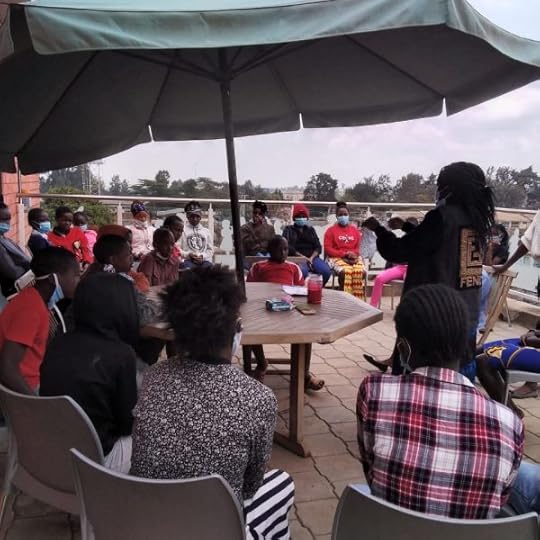 CFK staff led youth in discussions about menstrual hygiene in honor of Menstrual Hygiene Day 2021. (Photo Credit, Lilian Yuya, CFK Staff).
CFK staff led youth in discussions about menstrual hygiene in honor of Menstrual Hygiene Day 2021. (Photo Credit, Lilian Yuya, CFK Staff). “Though we divided adolescent girls and young women into three different groups, we kept boys and girls together,” said Sarah Ouma, CFK’s Girls Empowerment program coordinator. “Normally, schools lead girls-only sessions on MHM, so boys usually don’t have a chance to learn about menstruation. This misunderstanding can lead to them making fun of girls instead of supporting them during their periods.”
Managing Menstrual Hygiene & Addressing StigmaDuring the event, GEP staff and mentors led the adolescent girls and young women through three different sessions. The first session focused on the idea behind Menstrual Hygiene Day and why it is important. Staff emphasized that menstruation is a natural occurrence and should be discussed openly and honestly. They also taught girls and boys about different hygiene products, such as reusable sanitary towels, tampons, ruby cups, and disposable sanitary towels, and led demonstrations on how to use and dispose of them properly.
Next, the GEP team invited a nurse from Tabitha Medical Clinic to speak on the importance of hygiene before, during, and after menstruation. Since many girls take painkillers during their cycle, the nurse highlighted the dangers of overusing painkillers and led girls in an open discussion about how they felt during menses. Throughout this session, boys also learned how to actively support and stand up for girls to minimize any discomfort or embarrassment they might feel during menstruation.
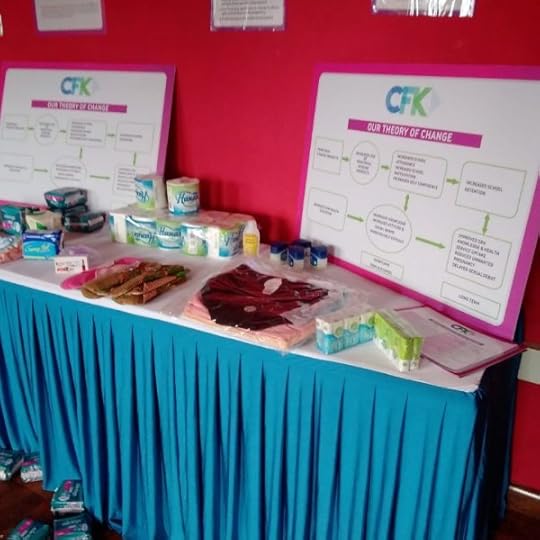 CFK taught girls about effective menstrual hygiene management (Photo Credit, Lilian Yuya, CFK Staff).
CFK taught girls about effective menstrual hygiene management (Photo Credit, Lilian Yuya, CFK Staff).  Youth learned and demonstrated how to use menstrual hygiene products correctly (Photo Credit, Lilian Yuya, CFK Staff).
Youth learned and demonstrated how to use menstrual hygiene products correctly (Photo Credit, Lilian Yuya, CFK Staff). “To address the stigma surrounding menstruation in Kibera community and Kenya at large, we need support and understanding across genders, and hence male engagement is important. I was happy to see many of the boys in attendance asking questions and participating in the activities,” Sarah said.
At the end of the event, participants visited CFK’s Young Health and Wellness Centre to learn about the youth-friendly resources available at the facility, including mental health counseling and sexual and reproductive health services. After the final session, girls received hygiene packs with sanitary towels, tissue paper, soap, underwear, and Vaseline, and boys received a pack with exercise books, soap, tissue paper, rulers, and Vaseline.
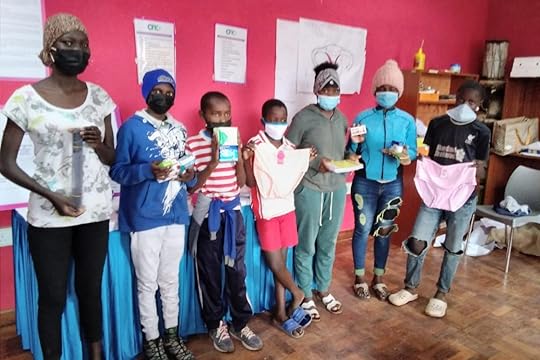 At the end of the event, girls received hygiene packs to take home (Photo Credit, Lilian Yuya, CFK Staff).
At the end of the event, girls received hygiene packs to take home (Photo Credit, Lilian Yuya, CFK Staff). “We wanted adolescent girls and young women to leave this event understanding that menstruation is natural and nothing to be ashamed, scared, or uncomfortable about,” Sarah explained. “Different communities still have their own myths and misconceptions about menstruation, and we believe that educating youth is the first step in addressing this misinformation.”
Learn more about CFK’s Girls Empowerment Program and Young Health and Wellness Centre.
Stories of Progress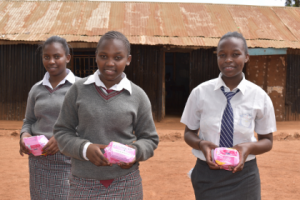 Managing Menstrual Hygiene & Addressing Menstrual ShameEducating young people on proper menstrual hygiene management is the first step in addressing misinformation and menstrual shame. On this year's Menstrual Hygiene Day, CFK led open discussions with adolescent girls and young women and distributed critical sanitary products.
Managing Menstrual Hygiene & Addressing Menstrual ShameEducating young people on proper menstrual hygiene management is the first step in addressing misinformation and menstrual shame. On this year's Menstrual Hygiene Day, CFK led open discussions with adolescent girls and young women and distributed critical sanitary products.
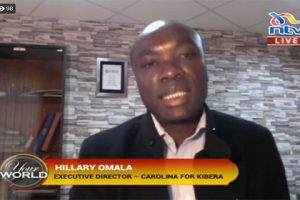 Hillary Omala Represents Informal Settlements on NTV Kenya PanelCFK executive director, Hillary Omala, discussed the social and economic impacts of COVID-19 on residents of informal settlements during a panel discussion broadcast on NTV Kenya on April 28.
Hillary Omala Represents Informal Settlements on NTV Kenya PanelCFK executive director, Hillary Omala, discussed the social and economic impacts of COVID-19 on residents of informal settlements during a panel discussion broadcast on NTV Kenya on April 28.
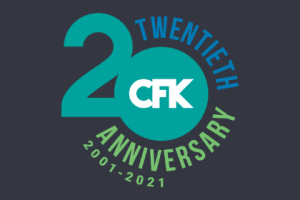 Launching the CFK Alumni NetworkAs a part of celebrating the 20th anniversary of CFK, we are launching the first-ever CFK volunteer alumni network, led by Yaniv Barzilai, which will invite past volunteers to reconnect and reminisce on their time in Kibera.Read more stories
Launching the CFK Alumni NetworkAs a part of celebrating the 20th anniversary of CFK, we are launching the first-ever CFK volunteer alumni network, led by Yaniv Barzilai, which will invite past volunteers to reconnect and reminisce on their time in Kibera.Read more storiesThe post Managing Menstrual Hygiene & Addressing Menstrual Shame appeared first on Carolina for Kibera.
April 29, 2021
Hillary Omala Represents Informal Settlements on NTV Kenya Panel
CFK executive director, Hillary Omala, discussed the social and economic impacts of COVID-19 for residents of informal settlements during a panel discussion broadcast on NTV Kenya on April 28.
Moderated by Victor Kripop, the panel also included Diana Gichengo, campaigns manager for Amnesty International and Dr. Kevin Osuri, chairman of Kenya Medical Practitioners, Pharmacists and Dentists Union (KMPDU).
During the discussion, Hillary emphasized how the COVID-19 pandemic has disproportionately impacted those living below the poverty line and working hand-to-mouth jobs.
“COVID-19 has been detrimental to social groups considered as vulnerable,” Hillary said. “That is young people, people living in informal settlements, [and] people with disabilities.”
Over the last 20 years, CFK has worked directly with many of these vulnerable groups, developing evidence-based, sustainable solutions to address their unique health, education, social, and economic needs.
In 2020, CFK partnered with the Centers for Disease Control and Prevention (CDC) and Kenya Medical Research Institute (KEMRI) to lead coronavirus sample collection and contact tracing efforts in Kibera.
Covid-19 effects have been detrimental to social groups considered as vulnerable – young people, people living in informal settlements, people with disabilities ~ Hillary Omala. #NewNormal @VictorKiprop_ pic.twitter.com/NlaLWASM7l
— NTV Kenya (@ntvkenya) April 28, 2021
Our water, sanitation, and hygiene (WASH) efforts have also helped alleviate financial burdens and curb the spread of infectious diseases like COVID-19 in Kibera. Due to our large-scale impact in Kibera, the CDC named CFK its lead implementing partner for WASH in Kenya, and we will be expanding many of our services to additional informal settlements starting this year.
More Than a Health Crisis
‘70% of people who live in informal settlements are truly skilled.’
What they lack is income security, they depend on factories, constructions works.’
The statement ‘I’d rather die of Covid-19 than hunger’ is a reality ~ Hillary Omala. #NewNormal @VictorKiprop_ pic.twitter.com/gi2tRdFfVC
— NTV Kenya (@ntvkenya) April 28, 2021
While the COVID-19 pandemic has resulted in one of the most severe global public health emergencies in recent history, it has also exacerbated existing social and economic inequalities.
During the pandemic, a study by the Population Council found that approximately 80% of people living in informal settlements around Nairobi experienced a partial or complete loss of income. Three-quarters of informal settlement residents reported skipping meals due to increased food insecurity.
“Until we recognize that there is an interface between a health crisis, an economic crisis, a human[itarian] crisis, and a social crisis, we are not likely to be able to solve these issues,” Hillary said. “Seventy percent of people who live in informal settlements are truly skilled…but what they do not have is income security…They depend on factories, they depend on companies, they depend on construction work. You had this statement going around of people saying ‘I would rather die of COVID-19 than of hunger,’ and it is a reality.”
Learn more about CFK’s COVID-19 response and watch the panel discussion in full.
Stories of Progress Hillary Omala Represents Informal Settlements on NTV Kenya PanelCFK executive director, Hillary Omala, discussed the social and economic impacts of COVID-19 on residents of informal settlements during a panel discussion broadcast on NTV Kenya on April 28.
Hillary Omala Represents Informal Settlements on NTV Kenya PanelCFK executive director, Hillary Omala, discussed the social and economic impacts of COVID-19 on residents of informal settlements during a panel discussion broadcast on NTV Kenya on April 28.
 Launching the CFK Alumni NetworkAs a part of celebrating the 20th anniversary of CFK, we are launching the first-ever CFK volunteer alumni network, led by Yaniv Barzilai, which will invite past volunteers to reconnect and reminisce on their time in Kibera.
Launching the CFK Alumni NetworkAs a part of celebrating the 20th anniversary of CFK, we are launching the first-ever CFK volunteer alumni network, led by Yaniv Barzilai, which will invite past volunteers to reconnect and reminisce on their time in Kibera.
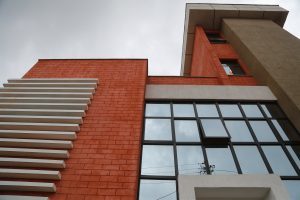 Building Foundations to Foster Aspirations in KiberaGrowing up just a few miles outside of Kibera, George Kuria always knew that the community was teeming with immeasurable potential. Now, he serves on CFK’s Board, helping bring greater opportunity to Kibera.Read more stories
Building Foundations to Foster Aspirations in KiberaGrowing up just a few miles outside of Kibera, George Kuria always knew that the community was teeming with immeasurable potential. Now, he serves on CFK’s Board, helping bring greater opportunity to Kibera.Read more storiesThe post Hillary Omala Represents Informal Settlements on NTV Kenya Panel appeared first on Carolina for Kibera.
April 19, 2021
Launching the CFK Alumni Network
Written by Yaniv Barzilai, CFK Advisory Council Member; Alumni Network Chair
Thirteen summers ago, after my first year at UNC, I took my first solo overseas trip to Kenya to volunteer with a small, scrappy non-governmental organization called CFK that had been started by two informal settlement community members and a recent UNC graduate. It was a particularly sensitive moment to arrive in Kibera, as just months earlier Kenya had erupted into ethnically-motivated violence sparked by a disputed presidential election. Kibera, often a mélange of shades of brown rust, was noticeably marred by bright silver corrugated tin as residents rebuilt homes, businesses, and markets recently burned to the ground during the post-election violence.
I am one of hundreds of volunteers from many walks of life who have traveled to Kibera to support an extraordinary group of Kiberans driving change within their community. My time with CFK propelled me in an unexpected direction, away from math and physics and towards a career in international relations and public service. I eventually found my way into the U.S. government as a diplomat and have tried to apply the concept of participatory development to high-level diplomatic engagement the United States conducts around the world. CFK occupies a special place in my heart, but also in my philosophy, about how to enact meaningful change. So, I did not hesitate when Rye Barcott, one of the founders of CFK, asked me to join CFK’s Advisory Council and help mark the organization’s 20th anniversary.
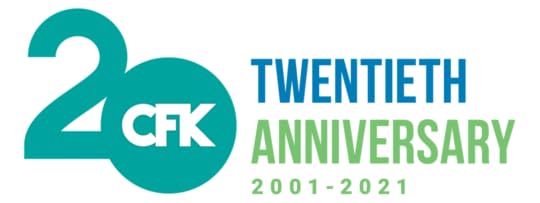 CFK celebrates its 20th year of service in the Kibera community on April 30, 2021.
CFK celebrates its 20th year of service in the Kibera community on April 30, 2021. In recent months, I have had the privilege to speak with dozens of former CFK volunteers who supported CFK’s growth into the impactful organization it is today. But the stories they shared with me were not just of their contribution to CFK but of Kibera’s impact on their personal and professional development. Many of us hope that we made a small difference during our time in Kibera, and we share the knowledge that our experiences shaped us for the better. CFK volunteer alumni have become health practitioners, scholars, community advocates, journalists, and policy experts – each committing their lives to service in varying ways.
As a part of celebrating the 20th anniversary of CFK, we are launching a CFK volunteer alumni network to bring former volunteers together to reconnect with each other and their experiences in Kibera. COVID has admittedly altered how we go about bringing people together, but in the coming months, we will invite former CFK volunteers to join a series of virtual catch-ups with Kenya- and U.S.-based CFK leaders. We will also look to these talented individuals to share their expertise and help guide CFK into the next decade of even greater growth and impact. In doing so, we hope CFK alumni may also find another community among their peers that can be part of their personal and professional development. Any former CFK volunteer interested in joining can register by filling out this brief survey.
Learn more about our newest CFK Peacock Fellow.
Stories of Progress Launching the CFK Alumni NetworkAs a part of celebrating the 20th anniversary of CFK, we are launching the first-ever CFK volunteer alumni network, led by Yaniv Barzilai, which will invite past volunteers to reconnect and reminisce on their time in Kibera.
Launching the CFK Alumni NetworkAs a part of celebrating the 20th anniversary of CFK, we are launching the first-ever CFK volunteer alumni network, led by Yaniv Barzilai, which will invite past volunteers to reconnect and reminisce on their time in Kibera.
 Building Foundations to Foster Aspirations in KiberaGrowing up just a few miles outside of Kibera, George Kuria always knew that the community was teeming with immeasurable potential. Now, he serves on CFK’s Board, helping bring greater opportunity to Kibera.
Building Foundations to Foster Aspirations in KiberaGrowing up just a few miles outside of Kibera, George Kuria always knew that the community was teeming with immeasurable potential. Now, he serves on CFK’s Board, helping bring greater opportunity to Kibera.
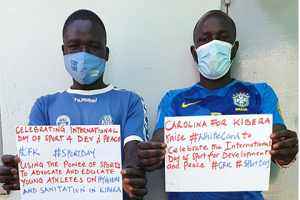 Rethinking the Role of Sport During COVID-19Sport education is a powerful means to foster physical fitness and mental well-being as well as social attitudes and behavior while populations are locked down. We remain committed to supporting young people throughout the COVID-19 pandemic. Read more stories
Rethinking the Role of Sport During COVID-19Sport education is a powerful means to foster physical fitness and mental well-being as well as social attitudes and behavior while populations are locked down. We remain committed to supporting young people throughout the COVID-19 pandemic. Read more storiesThe post Launching the CFK Alumni Network appeared first on Carolina for Kibera.
April 13, 2021
Building Foundations to Foster Aspirations in Kibera
Written by Hannah Bain, Communications Manager
Growing up just a few miles outside of Kibera, George Kuria always knew that residents faced many challenges, but he also recognized that the community was teeming with growing ambition and immeasurable potential. Now, he leads an international microinsurance and risk management company and serves on CFK’s Board of Directors to bring greater opportunity to Kibera.
George first heard about CFK from one of his good friends from university, Francis Kibet, who is currently CFK’s Board Treasurer. Drawn to the transparency and sustainability of the organization, George began serving on CFK’s Board of Directors more than six years ago and held the role of Chair of the Board in 2019.
“It has been an exciting journey with CFK,” George said. “We have learned and changed significantly as an organization, and our roles as Board Members have shifted with that. In the beginning, the Board had to focus on finances and processes, but now we get to discuss programs and expansion. Meeting people who participated in or were served by CFK programs and are now working for CFK or in the community is encouraging; that is impact.”
Finding Opportunities for ImpactSoon after George first joined the Board, CFK was planning for the design and development of the Binti Pamoja Centre, which would anchor the Girls Empowerment Program and serve as a central safe space for girls in the community. Always focused on “giving the best where [he] can,” George convinced an architect he knew to design the centre pro-bono. The resulting three-story facility, which includes one of the only usable rooftops in Kibera, remains a distinct building in the community and is a testament to some of CFK’s early efforts concerning girls’ empowerment.
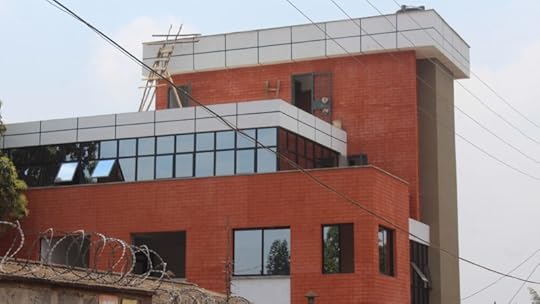 CFK Binti Pamoja Centre under construction in 2017 (Photo Credit, CFK).
CFK Binti Pamoja Centre under construction in 2017 (Photo Credit, CFK). “I have two daughters, and seeing the challenges they go through and the limited opportunities they have access to outside of an informal settlement has made me realize how much more difficult it must be for girls in a place like Kibera,” George said. “CFK strives to be a stepping stone to build opportunities, especially for young girls. A few years back, we had a young lady from Kibera, Susan Mueni Waita, earn an award from the Queen of England; those are the stories we want to keep seeing and sharing.”
Earning Goodwill and Fostering AspirationsSpending more than half a decade on CFK’s Board, George has witnessed the organization overcome challenges and make constant improvements to ensure transparency and build trust and goodwill with its partners and the Kibera community.
“I would love to see CFK be recognized as the premium NGO in Kibera for the real impact they do on the ground,” George said. “I think focusing on health programs is especially important in low-income communities. Because it is hand-to-mouth for many living in Kibera, people have to be able to work every day, and addressing health challenges early and quickly gives them a better opportunity to do that.”
Acknowledging that promoting comprehensive health requires work outside of the clinic, George also believes that investment in mental health and nutrition services is critical to keeping the community healthy and fostering ever-growing aspirations. While George always wants CFK to remain strong and secure in Kibera, he also hopes to see the organization expand to other informal settlements in Kenya.
“We’re focused on transitioning more programs from the vision stage to the implementation stage, and the [measurement and evaluation] reports are starting to show the fruits of our successes,” George said. “As we look at 20 years and beyond, everything is in place for even greater growth.”
Learn more about our Girls Empowerment Program.
Stories of Progress Building Foundations to Foster Aspirations in KiberaGrowing up just a few miles outside of Kibera, George Kuria always knew that the community was teeming with immeasurable potential. Now, he serves on CFK’s Board, helping bring greater opportunity to Kibera.
Building Foundations to Foster Aspirations in KiberaGrowing up just a few miles outside of Kibera, George Kuria always knew that the community was teeming with immeasurable potential. Now, he serves on CFK’s Board, helping bring greater opportunity to Kibera.
 Rethinking the Role of Sport During COVID-19Sport education is a powerful means to foster physical fitness and mental well-being as well as social attitudes and behavior while populations are locked down. We remain committed to supporting young people throughout the COVID-19 pandemic.
Rethinking the Role of Sport During COVID-19Sport education is a powerful means to foster physical fitness and mental well-being as well as social attitudes and behavior while populations are locked down. We remain committed to supporting young people throughout the COVID-19 pandemic.
 Introducing our 2021 Peacock FellowKeerti Kalluru is joining CFK as our 2021 Peacock Fellow. Keerti is a UNC student studying nutrition and human development and family studies. This year, she will be helping develop communications and fundraising material for our 20th Anniversary.Read more stories
Introducing our 2021 Peacock FellowKeerti Kalluru is joining CFK as our 2021 Peacock Fellow. Keerti is a UNC student studying nutrition and human development and family studies. This year, she will be helping develop communications and fundraising material for our 20th Anniversary.Read more storiesThe post Building Foundations to Foster Aspirations in Kibera appeared first on Carolina for Kibera.
April 5, 2021
Rethinking the Role of Sport During COVID-19
Written by Nicholas Kennedy Juma, Project Officer – Sports for Peace and Development
This year’s International Day of Sport for Development and Peace comes in the midst of Kenya’s most severe coronavirus surge to date. During this difficult time, we are reminded of the benefits of collaboration, the resilience of young people in our community, and the power of personal connections, all of which are continually mirrored in CFK’s Sports for Development project.
Since the onset of COVID-19 pandemic, physical distancing measures and lockdowns of businesses, schools and overall social life have become common–place to curtail the spread of the disease. Despite the challenges, sport remains a major contributor to economic and social development, especially among young people. As an organization, we have continued to support our beneficiaries and address their emerging needs through different strategies during this public health emergency.
The Impact of COVID-19 on YouthYoung people are particularly affected by social and physical distancing measures, considering interactive activities such as sport are commonly used as a tool to foster cooperation and sportsmanship, promote respectful competition, and teach conflict management skills. During this period without sport, many young people are losing more than the ability to compete; they are losing the ability to develop meaningful friendships, practice leadership skills, and participate in safe, supervised activities.
Furthermore, the closure of schools and loss of sport as an outlet has led to an increase in drug and substance abuse, physical violence, and underage crime among youth. With young people experiencing more free time and less supervision, teenage pregnancies are also on the rise.
Rethinking the Role of Sport During COVID-19Sport education is a powerful means to foster physical fitness and mental well-being as well as social attitudes and behavior while populations are locked down. We remain committed to supporting young people and helping them cope with this situation by convening small group discussions where we share and provide critical information on underlying issues that affect them amid the pandemic.
Community outreach and awareness-raising measures must be taken seriously to reach young athletes who are deeply affected by the pandemic, and our community Coaches remain key influencers ensuring that youth understand risks and respect guidance provided by the Ministry of Health. We also recognize that promoting positive social attitudes and behavior through the power of sport is key to addressing the challenges brought forth with the pandemic.
As a project and organization, we have sought to sensitize young people on water, sanitation, and hygiene (WASH) interventions in a bid to create awareness about the dangers of COVID-19 and educate youth on proper preventative measures against the disease. We have encouraged young people to regularly wash their hands with soap and running water, provided masks to schools, installed handwashing facilities in schools, and helped teach the community how to make liquid soap, enabling them to better cope with the prevailing conditions.
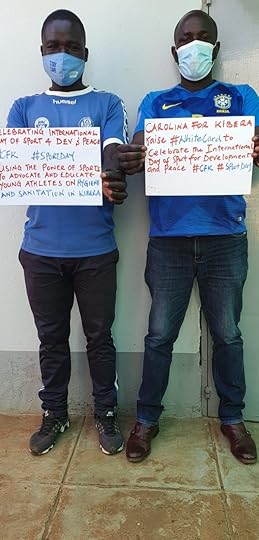 CFK staff advocate for Sports for Development in Kibera.
CFK staff advocate for Sports for Development in Kibera. Learn more about our Sport for Development project.
Stories of Progress Rethinking the Role of Sport During COVID-19Sport education is a powerful means to foster physical fitness and mental well-being as well as social attitudes and behavior while populations are locked down. We remain committed to supporting young people throughout the COVID-19 pandemic.
Rethinking the Role of Sport During COVID-19Sport education is a powerful means to foster physical fitness and mental well-being as well as social attitudes and behavior while populations are locked down. We remain committed to supporting young people throughout the COVID-19 pandemic.
 Introducing our 2021 Peacock FellowKeerti Kalluru is joining CFK as our 2021 Peacock Fellow. Keerti is a UNC student studying nutrition and human development and family studies. This year, she will be helping develop communications and fundraising material for our 20th Anniversary.
Introducing our 2021 Peacock FellowKeerti Kalluru is joining CFK as our 2021 Peacock Fellow. Keerti is a UNC student studying nutrition and human development and family studies. This year, she will be helping develop communications and fundraising material for our 20th Anniversary.
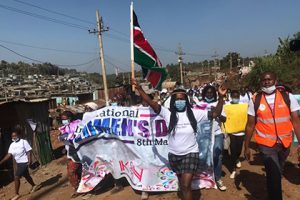 Celebrating International Women’s Day 2021As part of the K-GAN, CFK worked with 25 local organizations to organize a procession and celebration in honor of this year's International Women's Day, which recognized the critical role women play in ensuring an equitable recovery from COVID-19.Read more stories
Celebrating International Women’s Day 2021As part of the K-GAN, CFK worked with 25 local organizations to organize a procession and celebration in honor of this year's International Women's Day, which recognized the critical role women play in ensuring an equitable recovery from COVID-19.Read more storiesThe post Rethinking the Role of Sport During COVID-19 appeared first on Carolina for Kibera.
March 29, 2021
Introducing our 2021 Peacock Fellow
Written by Keerti Kalluru
My name is Keerti Kalluru, and I am excited to join CFK this year as the UNC Peacock Fellow. I am an undergraduate student at UNC pursuing degrees in Nutrition and Human Development & Family Studies. During my time at UNC, I have had the opportunity to engage in global health research, which fueled my interest in addressing health disparities especially in the field of maternal and child health. I believe in working with communities to improve access to nutrition and education, both of which can lead to healthy development and livelihoods.
In addition to my research work, I am the co-president of Healing in Motion – a student organization at UNC that promotes the well-being of people with chronic illness through dance – and I volunteer with Birth Beginnings Doula Volunteer Services.
I firmly believe in and support CFK’s community-driven approach and work to alleviate poverty throughout informal settlements. I am eager to elevate the work being done in Kibera and amplify the voices of community leaders for CFK’s 20th anniversary.
As this year’s UNC Peacock Fellow, I will be focusing on communications efforts for CFK’s 20th anniversary by creating promotional content and increasing engagement and fundraising.

In addition, I will support the expansion of CFK’s ethical research platform and will work on nutrition-related projects in collaboration with the Lishe Bora Mtaani Nutrition Centre in Kibera. Although this year has not been typical, I am really enthusiastic about contributing to CFK and maybe (hopefully!) will have the opportunity to witness the work of the wonderful team in Kenya sometime this year.
Here is a little more information about me:
Hobbies: I love to dance! I have been dancing Bharatanatyam (an Indian classical dance form) since I was seven years old. I am on a dance team at UNC and one of my favorite memories is when we won 2nd place at a national competition in Chicago. I also like reading, watching movies, and trying out arts and crafts.
Fun Fact: I lived in India for seven years and can speak three Indian languages – Telugu, Hindi, and Kannada.
One new thing I learned this year: My grandmother taught me how to use the sewing machine.
 Keerti performing with her dance team at UNC.
Keerti performing with her dance team at UNC.  Keerti visiting Golconda Fort in India.
Keerti visiting Golconda Fort in India. Help fund future international experiences for students.
Stories of Progress Introducing our 2021 Peacock FellowKeerti Kalluru is joining CFK as our 2021 Peacock Fellow. Keerti is a UNC student studying nutrition and human development and family studies. This year, she will be helping develop communications and fundraising material for our 20th Anniversary.
Introducing our 2021 Peacock FellowKeerti Kalluru is joining CFK as our 2021 Peacock Fellow. Keerti is a UNC student studying nutrition and human development and family studies. This year, she will be helping develop communications and fundraising material for our 20th Anniversary.
 Celebrating International Women’s Day 2021As part of the K-GAN, CFK worked with 25 local organizations to organize a procession and celebration in honor of this year's International Women's Day, which recognized the critical role women play in ensuring an equitable recovery from COVID-19.
Celebrating International Women’s Day 2021As part of the K-GAN, CFK worked with 25 local organizations to organize a procession and celebration in honor of this year's International Women's Day, which recognized the critical role women play in ensuring an equitable recovery from COVID-19.
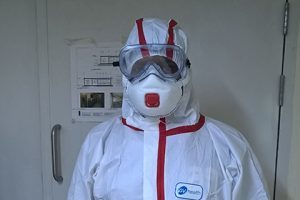 Research, Connections, and CommunityBorn, raised, and educated in Kibera, Melvin Ochieng connected with CFK during its early years. Now, 15 years later, he works as a Research Scientist at the Kenya Medical Research Institute (KEMRI), one of CFK’s largest research partners. Read more stories
Research, Connections, and CommunityBorn, raised, and educated in Kibera, Melvin Ochieng connected with CFK during its early years. Now, 15 years later, he works as a Research Scientist at the Kenya Medical Research Institute (KEMRI), one of CFK’s largest research partners. Read more storiesThe post Introducing our 2021 Peacock Fellow appeared first on Carolina for Kibera.
March 10, 2021
Celebrating International Women’s Day 2021
Written by Sarah Waithira & Hannah Bain
As part of the Kibra Gender Advocacy Network (K-GAN), CFK collaborated with more than two dozen local organizations to organize and raise funds for an event in honor of International Women’s Day (IWD), held March 8, 2021. This year’s theme was Women in Leadership: Achieving an equal future in a COVID-19 world, which recognized the resilience of women globally and their critical roles in helping to ensure a more equitable recovery from the pandemic.
“Organizations collaborating during major events brings together resources and attracts a larger audience within the community and the world,” said Sarah Waithira, CFK’s Girls Empowerment Program Coordinator. “When we are together, there is a lot of vibrancy, and we can raise more awareness and take greater action when we combine our resources.”
The event began with a procession to educate community members, which started at the Ayany main bus stop and wound along the dusty, narrow paths throughout Kibera. The procession ended in Laini Saba, one of Kibera’s 13 villages, and the location of the main celebration. Walking through the community allowed the group to reach thousands of residents, many of whom showed their support for the messages being shared.
 CFK celebrates International Women's Day in Kibera with the Kibra Gender Advocacy Network (Photo Credit, K-GAN).
CFK celebrates International Women's Day in Kibera with the Kibra Gender Advocacy Network (Photo Credit, K-GAN). The event itself was attended by the area member of Parliament’s wife as well as three local administrators. Following the procession, the local administrators, members of the county assembly, and representatives from K-GAN organizations shared words of encouragement and discussed women’s achievements in Kibera. Sarah Waithira, CFK’s Girls Empowerment Program Coordinator, and Lilian Yuya, one of CFK’s Girls Empowerment Program Assistants, served as CFK’s representatives at the event.
“All of the speakers shared words of encouragement for women,” Sarah said. “They spoke to the powerful role that women play in society and emphasized how successful we could be if women had equal opportunity.”
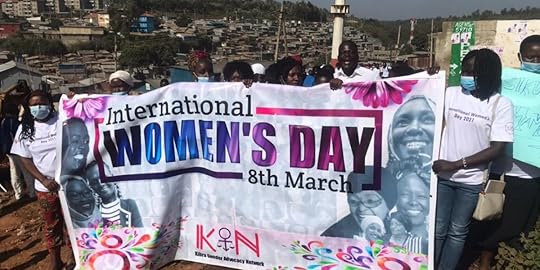 Raising community awareness during International Women's Day 2021 (Photo Credit, K-GAN).
Raising community awareness during International Women's Day 2021 (Photo Credit, K-GAN). This year’s IWD theme celebrated the tremendous efforts by women and girls around the world in shaping a more equal future and recovery from the COVID-19 pandemic. The event, which followed COVID-19 protocols such as mask-wearing, handwashing, and sanitizing, also recognized women in the community who “choose to challenge” sexual and gender-based violence and gender inequality throughout Kibera.
Learn more about our Girls Empowerment Program and help us support equal opportunity.
Stories of Progress Celebrating International Women’s Day 2021As part of the K-GAN, CFK worked with 25 local organizations to organize a procession and celebration in honor of this year's International Women's Day, which recognized the critical role women play in ensuring an equitable recovery from COVID-19.
Celebrating International Women’s Day 2021As part of the K-GAN, CFK worked with 25 local organizations to organize a procession and celebration in honor of this year's International Women's Day, which recognized the critical role women play in ensuring an equitable recovery from COVID-19.
 Research, Connections, and CommunityBorn, raised, and educated in Kibera, Melvin Ochieng connected with CFK during its early years. Now, 15 years later, he works as a Research Scientist at the Kenya Medical Research Institute (KEMRI), one of CFK’s largest research partners.
Research, Connections, and CommunityBorn, raised, and educated in Kibera, Melvin Ochieng connected with CFK during its early years. Now, 15 years later, he works as a Research Scientist at the Kenya Medical Research Institute (KEMRI), one of CFK’s largest research partners.
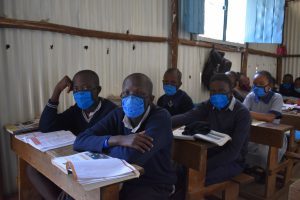 Reflecting on School Reopening in KenyaAfter a 10-month hiatus due to the coronavirus pandemic, schools in Kenya re-opened for all students on January 4, 2021. CFK is working with teachers and students to ensure they have the tools and knowledge needed to return to school safely.Read more stories
Reflecting on School Reopening in KenyaAfter a 10-month hiatus due to the coronavirus pandemic, schools in Kenya re-opened for all students on January 4, 2021. CFK is working with teachers and students to ensure they have the tools and knowledge needed to return to school safely.Read more storiesThe post Celebrating International Women’s Day 2021 appeared first on Carolina for Kibera.
March 3, 2021
Research, Connections, and Community
Contributions from Melvin Ochieng, Written by Hannah Bain
Born, raised, and educated in Kibera, Melvin Ochieng connected with CFK during its early years. Now, 15 years later, he works as a Research Scientist at the Kenya Medical Research Institute (KEMRI), one of CFK’s largest research partners.
Jennifer Coffman, a long-standing CFK Board Member and friend of Melvin’s family, connected Melvin to CFK co-founder Salim Mohamed in 2005. At the time, Salim was serving as CFK’s Executive Director, and Melvin was halfway through a university degree in biochemistry. Impressed by Melvin’s knowledge and initiative, Salim invited him to work as a data collector with CFK during the break between his second and third year at university.
“As part of its effort to collect data on perceptions and knowledge of HIV/AIDs and sexual and reproductive health in Kibera, CFK trained young people like me and then sent us into the community to gather information from residents,” Melvin said. “I had always known that I wanted to work in research, which is part of the reason I chose to study biochemistry. As a data collector with CFK, I got to take research into a real-life setting.”
In addition to working as a data collector with CFK, Melvin also interned at Tabitha Medical Clinic and participated in additional CFK projects, such as community clean-ups. When Melvin completed university, Salim connected him with KEMRI – a company that had “always been on [Melvin’s] radar” – and recommend him for a full-time position.
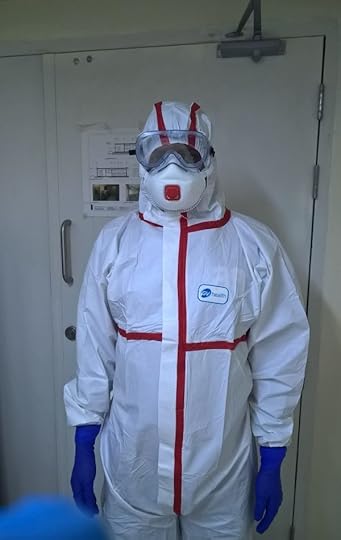 Melvin preparing for work at KEMRI. (Photo Credit, Melvin Ochieng). Combatting COVID-19 at KEMRI
Melvin preparing for work at KEMRI. (Photo Credit, Melvin Ochieng). Combatting COVID-19 at KEMRIMelvin started work with KEMRI as a Data Clerk but quickly landed a role as a Research Scientist. Before the pandemic, most of his work consisted of building capacity at the National Influenza Centre, writing reports, and ensuring that the lab operated smoothly.
“When I first started with KEMRI, they were still doing quite a number of projects with CFK, and now we are working on testing COVID-19 samples, many of which are coming from Tabitha Medical Clinic,” Melvin noted, finding connections to CFK more than a decade later.
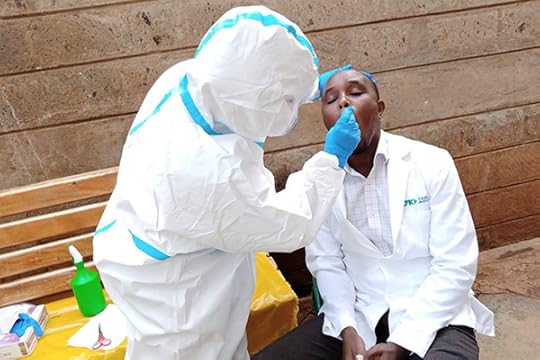 Tabitha Medical Clinic partnered with the Centers for Disease Control and Kenya Medical Research Institute to lead coronavirus sample collection and contact tracing efforts in Kibera. To date, we have collected more than 3,000 samples. (Photo Credit, CFK)
Tabitha Medical Clinic partnered with the Centers for Disease Control and Kenya Medical Research Institute to lead coronavirus sample collection and contact tracing efforts in Kibera. To date, we have collected more than 3,000 samples. (Photo Credit, CFK) Now, Melvin’s days are “dominated by COVID-19.” He and his team work to test COVID-19 samples and compile and distribute results to contact tracers and the Ministry of Health. Despite the challenging circumstances, Melvin finds fulfillment in his work every day.
“At the end of the day, we feel like we are making a difference, doing our part, and helping the public,” Melvin said. “We’re collaborating with the government to test as many people as possible. The work we do goes a long way in guiding government policy, especially in terms of COVID.”
Lessons Learned from CFKIn addition to combatting COVID-19, Melvin is also completing a Master’s degree in Microbiology, and he hopes to one day pursue his Ph.D. abroad. While he seeks to continue expanding and refining his analytical skills, Melvin also recognizes that the early lessons he learned about research through CFK will never grow obsolete.
“CFK is different because they are in touch with the people of Kibera, the community itself, and the life that the people live,” Melvin said. “Some of my colleagues at KEMRI previously worked as community interviewers with CFK. Even now, when they walk through the community, they are loved and people reach out to them. CFK is doing something right, and if they keep doing what they’re doing, they will be here for a long time.”
Learn more about our research partnerships and invest in knowledge generation.
Stories of Progress Research, Connections, and CommunityBorn, raised, and educated in Kibera, Melvin Ochieng connected with CFK during its early years. Now, 15 years later, he works as a Research Scientist at the Kenya Medical Research Institute (KEMRI), one of CFK’s largest research partners.
Research, Connections, and CommunityBorn, raised, and educated in Kibera, Melvin Ochieng connected with CFK during its early years. Now, 15 years later, he works as a Research Scientist at the Kenya Medical Research Institute (KEMRI), one of CFK’s largest research partners.
 Reflecting on School Reopening in KenyaAfter a 10-month hiatus due to the coronavirus pandemic, schools in Kenya re-opened for all students on January 4, 2021. CFK is working with teachers and students to ensure they have the tools and knowledge needed to return to school safely.
Reflecting on School Reopening in KenyaAfter a 10-month hiatus due to the coronavirus pandemic, schools in Kenya re-opened for all students on January 4, 2021. CFK is working with teachers and students to ensure they have the tools and knowledge needed to return to school safely.
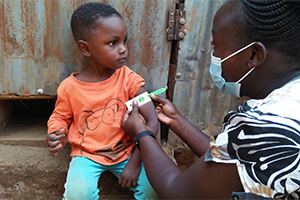 Championing Child Development through Nutrition and PlayDespite the challenges posed by the COVID-19 pandemic, Frankline Mwenda and his nutrition team have successfully cured and discharged 45 previously malnourished children during the pandemic. Now, they're continuing to respond to increased needs and expanding their impact in Kibera.Read more stories
Championing Child Development through Nutrition and PlayDespite the challenges posed by the COVID-19 pandemic, Frankline Mwenda and his nutrition team have successfully cured and discharged 45 previously malnourished children during the pandemic. Now, they're continuing to respond to increased needs and expanding their impact in Kibera.Read more storiesThe post Research, Connections, and Community appeared first on Carolina for Kibera.
February 18, 2021
Reflecting on School Reopening in Kenya
Written by Joshua Omweno & Hannah Bain
After a 10–month hiatus due to the coronavirus pandemic, schools in Kenya re-opened for all students on January 4, 2021. Despite the universal re-opening, thousands of students did not return to school.
“Everyone has felt the effects of the pandemic,” said Joshua Omweno, CFK’s Angaza Scholarship Program Officer. “Many experienced job loss, and others moved to more rural areas to reduce expenses. With a shift in dwelling spaces, we saw quite a number of students transfer to different schools, and that can be difficult to track on a large-scale level.”
Though the education sector attempted to ensure continuity of learning, Joshua highlighted that they were “not able to develop integrated learning modes.” In other words, not all schools could afford the technology needed to facilitate distance learning for all students.
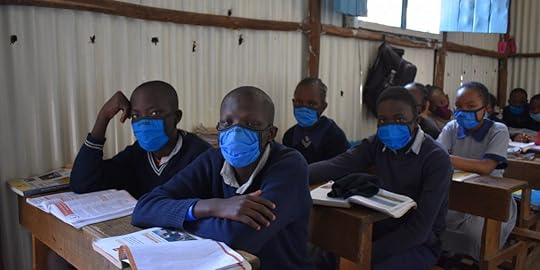 CFK provides masks to students so they can return to schools more safely (Photo Credit, Georgette Adrianne). The Impact of School Closures on Youth
CFK provides masks to students so they can return to schools more safely (Photo Credit, Georgette Adrianne). The Impact of School Closures on YouthWith the loss of schools as “safe spaces” and four out of five families in informal settlements struggling with income loss, many students turned to informal work.
“In rural areas, many males found income generating activities like driving boda bodas (bicycle and motorcycle taxis) and some did not to return to school because they were making income,” Joshua noted.
Female students, who faced issues related to gender inequality before the pandemic, have become even more at-risk of sexual and gender-based violence (SGBV) and teenage pregnancy. During three months of lockdown early in the pandemic, Kenya experienced a 40 percent increase in teenage pregnancies, which may lead to many school-aged girls failing to return to class.
Schools themselves also faced challenges during the shutdown. Many private schools operated by religious organizations or non-governmental organizations (NGOs) closed due to lack of funds. Prolific in Kibera, private schools tend to have smaller class sizes than their public counterparts, but without government support, they rely on student school fees to operate. With thousands of families facing increased economic challenges, many private, “informal” schools across Kenya collapsed.
 Students resume classes at a school in Kibera (Photo Credit, CFK). Working Together to Resume School Safely
Students resume classes at a school in Kibera (Photo Credit, CFK). Working Together to Resume School SafelyThough the country introduced protocols for schools to follow and anticipated universal school re-opening for months, challenges still remain.
Lacking access to classrooms for nearly a year, many students may struggle with academic performance as regular schedules resume. Though there will “be time for them to catch up,” students sitting for final exams in a few months are under increased pressure.
Fortunately, CFK distributed approximately 10,900 revision packets to beneficiaries during the pandemic-related school closures, allowing hundreds of students to retain access to academic material even if they could not participate in distance learning. While not a complete substitute for real-time, in-person learning, Joshua and his team believe the material helped keep students engaged in learning during the shutdown.
Schools in areas like Kibera, where student populations are high, government support is minimal, and resources are scarce, have struggled to provide the necessary supplies (i.e., face masks and handwashing stations) to their students. Those that do find a way to provide PPE and WASH materials still battle with enforcing the new rules.
“We have always seen resilience in Kiberans, and we have tried to do our part to ensure kids go back to school safely,” Joshua said. “It is one thing to give schools guidelines and provide masks for students, but it is an entirely different thing to ensure students are wearing the masks throughout the day and understand why they need to do so.”
When schools first re-opened, Joshua and other CFK staff noticed students in lower grades pulling their masks down and even swapping masks with one another throughout the day. In response, he and his team have focused some of their efforts on sensitization. They continually educate students on how to wear a mask and wash their hands effectively.
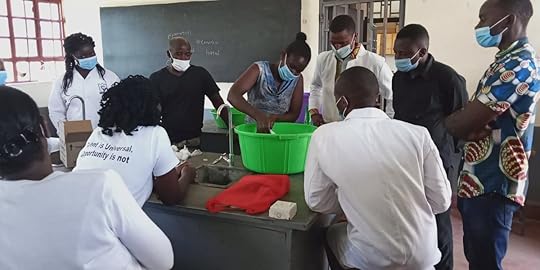 CFK staff lead a soap making demonstration at a school in Kibera (Photo Credit, Georgette Adrianne). Collaboration Across CFK Programs
CFK staff lead a soap making demonstration at a school in Kibera (Photo Credit, Georgette Adrianne). Collaboration Across CFK ProgramsPrior to school re-opening, CFK conducted a survey to gauge the status of learning in Kibera during the coronavirus pandemic and related school closures A total of 307 parents, 197 students and 48 schools participated in the survey. On average, the survey found that students spent less time on schoolwork than they otherwise would have during ordinary times. Parents said that their children spent a median of two hours per day and an average of 2.7 hours per day on schoolwork during the COVID-19 pandemic and related school closures.
“Reduced time on schoolwork likely reflected a lower availability of learning materials and a lack of structure in the home environment,” Joshua noted.
Currently, CFK is working with more than 70 schools previously identified as part of its Best Schools Initiative (BSI) and Girls Empowerment Program (GEP). Community Health Volunteers (CHVs) and Community Health Workers (CHWs) continue to connect CFK with additional schools that need support.
“From our end and working with CFK’s Community Outreach Program, we are continuing to equip schools with handwashing facilities and thermal guns to monitor student temperature,” Joshua said. “We also help supply face masks and teach educators how to make and use liquid soap in school so they do not have to buy it from the stores.”
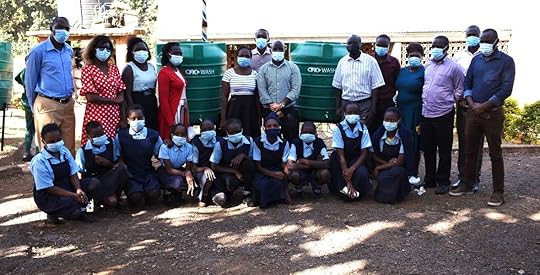 CFK provides handwashing tanks to schools in Kibera (Photo Credit, Georgette Adrianne) Finding a Silver Lining
CFK provides handwashing tanks to schools in Kibera (Photo Credit, Georgette Adrianne) Finding a Silver LiningIn addition to working directly with students and educators, CFK has established a relationship with the sub-county education team to connect its programs to additional public and informal/APBET (alternative providers of basic education and training) schools. As CFK works alongside local partners to promote safe school re-opening over the next few months, the organization is also collecting data on how many students return to school and why some may choose not to, which will inform future efforts.
Despite the widespread negative effects of the COVID-19 pandemic, Joshua has recognized some positive impacts due to behavior changes over the last 10 months.
“Learning WASH at a young age will lead to good hygiene practices at school and home, which could decrease the spread of some other communicable diseases present in the community,” Joshua said. “We have also seen parents more involved in their children’s health, which may translate to increased academic involvement as well. Program-level parental engagement is something we really strive for, so I hope this is something that remains moving forward.”
Support CFK’s continued COVID-19 response and read about Joshua’s journey from an Angaza scholarship recipient to a leader on our CFK staff.
Stories of Progress Reflecting on School Reopening in KenyaAfter a 10-month hiatus due to the coronavirus pandemic, schools in Kenya re-opened for all students on January 4, 2021. CFK is working with teachers and students to ensure they have the tools and knowledge needed to return to school safely.
Reflecting on School Reopening in KenyaAfter a 10-month hiatus due to the coronavirus pandemic, schools in Kenya re-opened for all students on January 4, 2021. CFK is working with teachers and students to ensure they have the tools and knowledge needed to return to school safely.
 Championing Child Development through Nutrition and PlayDespite the challenges posed by the COVID-19 pandemic, Frankline Mwenda and his nutrition team have successfully cured and discharged 45 previously malnourished children during the pandemic. Now, they're continuing to respond to increased needs and expanding their impact in Kibera.
Championing Child Development through Nutrition and PlayDespite the challenges posed by the COVID-19 pandemic, Frankline Mwenda and his nutrition team have successfully cured and discharged 45 previously malnourished children during the pandemic. Now, they're continuing to respond to increased needs and expanding their impact in Kibera.
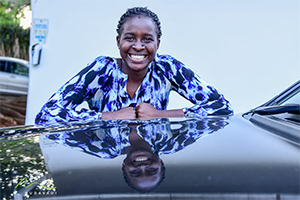 Securing More than a ScholarshipWith her parents unable to financially support two children through secondary school, Nancy Muga had two options: wait for her brother to graduate or secure a scholarship for herself.Read more stories
Securing More than a ScholarshipWith her parents unable to financially support two children through secondary school, Nancy Muga had two options: wait for her brother to graduate or secure a scholarship for herself.Read more storiesThe post Reflecting on School Reopening in Kenya appeared first on Carolina for Kibera.
February 9, 2021
Championing Child Development through Nutrition and Play
Contributions by Frankline Mwenda | Written by Hannah Bain
Frankline Mwenda, Frank for short, “finds joy” in his job every day as the lead of CFK’s Lishe Bora Mtaani Nutrition Centre. After studying nutrition and dietetics in college and working as a nutritionist intern at Kenyatta National Hospital, Frank joined CFK in 2015. He now leads a team of eight staff, which currently supports 28 malnourished children and, on average, screens between 18,000 and 20,000 children for malnutrition every year.
The nutrition centre promotes comprehensive childhood development through an eight-week malnutrition management program paired with engaging activities that encourage mental stimulation.
“In addition to providing children with the nutrients they need, we train mothers on infant and young child feeding practices and show them how they can play with their children at different ages and stages to promote healthy development,” Frank said. “We also teach them how to make toys using locally available materials so they can save money for food and other essential items.”
From the Centre to the FieldThough Frank and his team currently support more than two dozen children through the nutrition centre, they know many more are in need. Malnutrition is widespread in the Kibera community, and the COVID-19 pandemic has exacerbated existing food insecurity.
 Frank measures a child's height as part of CFK's nutrition programming. (Photo Credit, Frank Mwenda)
Frank measures a child's height as part of CFK's nutrition programming. (Photo Credit, Frank Mwenda) During the first half of each day, Frank and the nutrition team focus on children enrolled in the program, reviewing their progress and prescribing their diet. While the team prepares to move into the field mid-morning, early childhood development (ECD) teachers remain at the centre to feed and care for children in the program. In the community, Frank and his team visit households and lead growth monitoring and promotion (GMP). When they identify a malnourished child, they refer them to the nutrition centre for further assessment and support. On a yearly basis, the team reaches approximately 8,000 children with GMP and 10,000 children through active case finding.
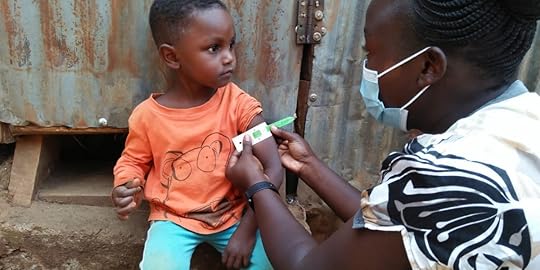 A member of the CFK nutrition team measuring a child's middle-upper arm circumference (MUAC) as part of nutrition programming (Photo Credit, Frank Mwenda)
A member of the CFK nutrition team measuring a child's middle-upper arm circumference (MUAC) as part of nutrition programming (Photo Credit, Frank Mwenda) “There are many families in the community that face significant food insecurity,” Frank said. “Sometimes, there will be two or three kids in one household struggling with malnutrition.”
Identifying, referring, and supporting children in need is a never-ending process, but Frank finds fulfillment through his job every day.
“I can truly say that it is always my happiness to see kids cured [of malnutrition],” he said. “I find joy when children come in for review and I see that they are strong and doing well.”
Adapting to COVID-19The nutrition centre team is well-versed in supporting children through challenging situations within Kibera, but they have had to adapt more creatively throughout the COVID-19 pandemic. Traditionally, the program hosts participating children all day, ensuring they receive the food and nutrition supplements they need. Since the onset of the pandemic, staff have not been able to host children at the facility, so they began sending supplements home with caretakers.
Though the families continued to receive the supplements their children needed, nutrition centre staff conducting follow-up via phone calls began finding that many kids had stopped progressing.
“We learned that the supplements we provided for the kids were being shared among the household,” Frank said. “Many families became so food insecure that caretakers could not justify using the food and supplements provided to support just one of their children. We try to discourage the sharing of supplements, but it is very difficult to tell families that they need to save food for one of their children while the others go hungry.”
 CFK nutrition staff working in the field to support malnourished children in Kibera (Photo Credit, Frank Mwenda)
CFK nutrition staff working in the field to support malnourished children in Kibera (Photo Credit, Frank Mwenda) Despite the challenges posed by COVID-19, Frank and his team ensured that children served by the nutrition centre continued to progress. They distributed food packages to all malnourished children enrolled in the program and successfully cured and discharged 45 children during the pandemic.
Expanding Impact & Promoting PlayAs nutrition centre staff continue responding to needs created and exacerbated by the pandemic, Frank is also considering how to expand his team’s impact.
“Growth and development are topics I think about each and every day,” he said. “By the end of this year, I plan for us to have a presence and conduct growth monitoring and promotion in all of Kibera’s 13 villages.”
In addition to geographic expansion, the team plans on partnering with early childhood development (ECD) centres to lead discussions on nutrition, review school diets, and train teachers on water, sanitation, and hygiene (WASH). They also hope to promote creative, constructive play more widely in ECD centres.
For example, Frank mentioned that some centres could introduce a small garden, which could help improve various aspects of childhood development. First, better access to fresh fruits and vegetables would directly benefit children nutritionally. Additionally, learning how to garden could help foster children’s mental development, problem-solving abilities, and motor skills.
“Care for child development and improving the nutritional status of the children are our main objectives, and achieving those requires adequate nutrition and mental stimulation,” Frank said. “Like many CFK programs, we take a comprehensive approach to care, and we’re exploring more creative ways to connect physical and mental development moving forward.”
Learn more about our Lishe Bora Mtaani Nutrition Centre, and see what a day in the life looks like for a Community Health Worker in our nutrition program.
Stories of Progress Championing Child Development through Nutrition and PlayDespite the challenges posed by the COVID-19 pandemic, Frankline Mwenda and his nutrition team have successfully cured and discharged 45 previously malnourished children during the pandemic. Now, they're continuing to respond to increased needs and expanding their impact in Kibera.
Championing Child Development through Nutrition and PlayDespite the challenges posed by the COVID-19 pandemic, Frankline Mwenda and his nutrition team have successfully cured and discharged 45 previously malnourished children during the pandemic. Now, they're continuing to respond to increased needs and expanding their impact in Kibera.
 Securing More than a ScholarshipWith her parents unable to financially support two children through secondary school, Nancy Muga had two options: wait for her brother to graduate or secure a scholarship for herself.
Securing More than a ScholarshipWith her parents unable to financially support two children through secondary school, Nancy Muga had two options: wait for her brother to graduate or secure a scholarship for herself.
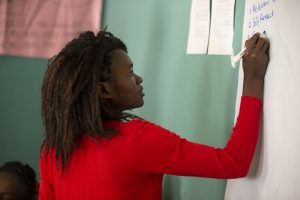 Promoting Healthy Decisions through Counseling and ConnectionsVictrine Oluoch was born to be a counselor. Growing up, she frequently offered advice to her friends, and, after serving as a peer mentor in high school, she recognized that her interest could lead to a purposeful career. Read more stories
Promoting Healthy Decisions through Counseling and ConnectionsVictrine Oluoch was born to be a counselor. Growing up, she frequently offered advice to her friends, and, after serving as a peer mentor in high school, she recognized that her interest could lead to a purposeful career. Read more storiesThe post Championing Child Development through Nutrition and Play appeared first on Carolina for Kibera.
Rye Barcott's Blog
- Rye Barcott's profile
- 7 followers



